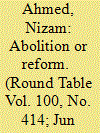| Srl | Item |
| 1 |
ID:
105401


|
|
|
|
|
| Publication |
2011.
|
| Summary/Abstract |
This paper explores the characteristics, performance and pitfalls of the non-party caretaker government (NPCG) system that Bangladesh has developed to ensure foolproof parliamentary elections and an orderly succession of government. This system differs from the traditional system of the succession of government in a number of ways: first, none of the caretakers (members of NPCG) can be a member of the outgoing government; second, no caretaker can contest the elections; and third, none can also be a member of any political party. The NPCG can undertake only election-related activities; it is not authorised to take any major policy decision. The article examines the context within which the successive caretaker governments (since 1991) have worked and compares and contrasts their performance. It shows that although initially appreciated for its unique contribution to the transition to democracy from authoritarianism, and particularly to the orderly succession of government, the NPCG system has recently been attacked and seemingly rejected by those who were instrumental in its creation-party politicians. This paper explores the logic and politics underlying the shift in party attitude towards the NPCG system, arguing that the latter probably outweighs the former. It suggests that the system needs reform, not abolition.
|
|
|
|
|
|
|
|
|
|
|
|
|
|
|
|
| 2 |
ID:
106717


|
|
|
|
|
| Publication |
2011.
|
| Summary/Abstract |
This article explores the significance of the ninth parliamentary election, held in December 2008, for democratic consolidation in Bangladesh. Three factors have made the ninth election important: first, it was held after two years of military-backed civilian caretaker rule when the government had adopted several measures for electoral and political reforms; second, the main parties formed pre-election alliances to face each other, rather than contesting the election on an individual basis, as was the practice in the past; and third, the composition of the electorate changed significantly, with nearly one-third of the voters casting votes for the first time. The use of a foolproof electoral roll also made the election results credible. Unlike the past, no major case of election rigging has been reported to the Election Commission after the elections. Nor did those losing the elections reject the results outright. The government also initially adopted a policy of inclusion, creating some space for the opposition to be proactive, and the opposition reciprocated by attending the inaugural session of the ninth parliament and pledging to make the parliament effective. The article explores the significance of this change in attitude as well as different electoral reforms for democratic consolidation in the country.
|
|
|
|
|
|
|
|
|
|
|
|
|
|
|
|